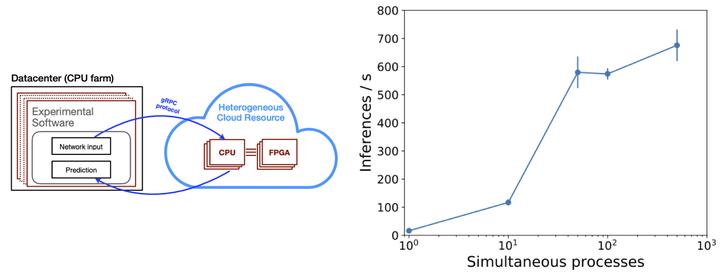FPGA-Accelerated Machine Learning Inference as a Service for Particle Physics Computing
 An illustration of FPGA-accelerated ML cloud resources as a service (left). Throughput of the FPGA service as the number of ResNet-50 inferences per second for different numbers of simultaneous processes on the Brainwave system (right).
An illustration of FPGA-accelerated ML cloud resources as a service (left). Throughput of the FPGA service as the number of ResNet-50 inferences per second for different numbers of simultaneous processes on the Brainwave system (right).
Abstract
Large-scale particle physics experiments face challenging demands for high-throughput computing resources both now and in the future. New heterogeneous computing paradigms on dedicated hardware with increased parallelization, such as Field Programmable Gate Arrays (FPGAs), offer exciting solutions with large potential gains. The growing applications of machine learning algorithms in particle physics for simulation, reconstruction, and analysis are naturally deployed on such platforms. We demonstrate that the acceleration of machine learning inference as a web service represents a heterogeneous computing solution for particle physics experiments that potentially requires minimal modification to the current computing model. As examples, we retrain the ResNet-50 convolutional neural network to demonstrate state-of-the-art performance for top quark jet tagging at the LHC and apply a ResNet-50 model with transfer learning for neutrino event classification. Using Project Brainwave by Microsoft to accelerate the ResNet-50 image classification model, we achieve average inference times of 60 (10) ms with our experimental physics software framework using Brainwave as a cloud (edge or on-premises) service, representing an improvement by a factor of approximately 30 (175) in model inference latency over traditional CPU inference in current experimental hardware. A single FPGA service accessed by many CPUs achieves a throughput of 600–700 inferences per second using an image batch of one, comparable to large batch-size GPU throughput and significantly better than small batch-size GPU throughput. Deployed as an edge or cloud service for the particle physics computing model, coprocessor accelerators can have a higher duty cycle and are potentially much more cost-effective.
Supplementary notes can be added here, including code and math.